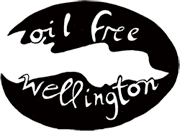Taranaki community transition plan wants fossil fuel phase out by 2030
A new just transition plan released today by Climate Justice Taranaki calls for a major shift towards a domestic economy and away from exports and imports in a phase out of fossil fuels by 2030.

The document focuses on Aotearoa’s three main greenhouse gas emitters: energy, transport and agriculture with targets and localised action plans for these and major reforestation works, political and cultural shifts, and education campaigns.
“There is a growing call to focus less on detailed emissions targets and more on the action needed to reduce emissions and ensure environmental, social, cultural and economic sustainability. In our just transition strategy document we call for bans on new fossil fuel exploration and production by 2023 and bans on new combustion engine imports and new fossil fuel infrastructure for agriculture and other industries by 2022.” said Emily Tuhi-Ao Bailey from Climate Justice Taranaki.
“The transition we need can be described as shifting from an extractive economy to a regenerative economy. Shifting away from a coloniser mindset to a kaitiaki mindset. To build the new though, we must also stop the bad. This involves having the courage, nous and support to shift power and resources away from the few to the many. Shifting from an individualistic mindset to a community mindset.”
“We have spent over a year researching and testing plans and ideas to find a realistic path forwards that actually brings emissions down fast enough. There are too many false corporate solutions having public money poured into them without proper consideration – hydrogen being one, which is now shown to be at it’s best, a highly inefficient use of renewable energy and at it’s worst, business-as-usual for the gas industry.”
“The big dinosaur in the room though was our whole export economy, where we have primary industries exporting the majority of their product overseas only for us to import similar product back in. We are burning up finite fossil fuels and overexploiting our environment to supply ten times our population overseas, leaving behind toxic wastes and damaging ecosystems, while profits go to corporate investors rather than in to communities. In effect companies privatise the profits but socialise the losses, both environmentally and socially. We use cheap labour overseas and poor migrants here to do our dirty work. As a country we are rich enough to provide decent working conditions here while supporting nations in need overseas. Domestic manufacturing should be rebuilt and endless growth models of primary production need to end so everyone can afford to meet their basic needs.”
“This all goes back to capitalist theories of exploitation and greed being ‘okay’. The misogynist, white supremacy that led to western Europe’s colonisation of much of the planet thanks to the machines of the industrial revolution fuelled by coal, oil and gas. Climate change is the direct result of these gilded economic theories which Aotearoa still holds to.”
“True sustainability means downshifting to live within the ecological boundaries of these beautiful islands. It means treating whenua, wai and all living things with respect, and providing for a meaningful life for all in our communities.”
“This can be done through reduction, removal, re-localisation and substitution. In other words, reduce our energy consumption first and foremost, remove fossil fuels and associated machines and infrastructure that can’t be repurposed, decentralise our public services and economies so we have the capacity to live and work within our local environs, and substitute essential energy needs with renewable energy and sustainably produced biofuels. This needs to be matched with accelerated rewilding of much of our land and seas.”
“Many concerned about climate change and excessive resource extraction have long been working on finding the underlying problems and the best solutions for a sustainable and just future. We have struggled for generations to be heard, meticulously gathering evidence, trialling solutions and demanding change on the streets and in the halls of businesses, councils, parliaments and the UN. The rich elites and their corrupt politicians, who have plundered and profited off the destruction of our biosphere, have stood in the way of a just transition all that time denying their harm, offering false solutions that greenwash ‘business as usual’ and suggesting individual change rather than system change. The poor and working classes who already suffer the most, did not make this problem, big industry did and they must halt their polluting and carry the cost of transition for society.”
The ‘Toitū Taranaki 2030’ just transition strategy can be found on Climate Justice Taranaki’s website here. The group is releasing the document at a Climate Strike event in New Plymouth at Puke Ariki Landing at midday.
“This plan focuses on our region of Taranaki but we need the country to change if we are to effectively change. Hence the targets and suggestions for change are generic with a focus on Taranaki. It is hoped this document will be useful for setting good targets, time frames and action paths that can be used by our communities here and in other parts of the country including councils, government, iwi and businesses.” concluded Bailey.
